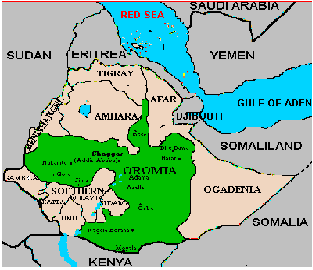11/05/2006 (eitb) - Standing on the elegant lawn of a foreign embassy, Bulcha Demeksa recounts passionately the daily trials of being an opposition member in Ethiopia.
Sometimes they are mundane: "Opposition members of parliament don't even have an office. If I want to read a document privately, I have to go out into the garden." Sometimes they are more chilling: "A party member was taken by state security to a distant place in the night and threatened. He fled to Kenya. So we lost a seat just like that."
Either way, the picture painted by the leader of the Oromo Federalist Democracy Movement (OFDM) is one of an opposition movement cowed and corralled by Prime Minister Meles Zenawi's government and security apparatus on all fronts.
"I don't see any intention to democratise this country, no softness of any manner," Bulcha, from the vast Oromia region, laments in a brief aside to a reporter at a cocktail event in the lavish grounds of the U.S. embassy in Addis Ababa.
"There is no way of fighting. The opposition is too weak." Such talk might in one sense be music to the ears of Meles and his aides, who last year feared a buoyant opposition represented a real threat to their 15-year grip on power after the overthrow of former dictator Mengistu Haile Mariam.
New breed of leaders
However, they also know that talk of lack of democracy inflicts further damage on the international reputation of Meles. Once feted by the West as one of a new breed of progressive African leaders, he is now criticised as an autocrat. "They had this idea of a new breed of leaders from Eritrea to the Congo," scoffed another opposition leader, Merera Gudina who leads the Oromo National Congress (ONC).
"Then country-by-country the thesis was blown apart. It was more in the imagination of the foreigners," he added. "Here in Ethiopia, we have a personal dictatorship...We (the opposition) are powerless but we will never give up."
Ethiopia is still struggling to recover from a turbulent 2005, when fraud complaints and unrest following an election won by Meles led to scores of deaths. An inquiry set up by parliament found that 193 civilians were killed and 30,000 were detained during violence in Addis Ababa and elsewhere.
More than 100 leaders of the opposition Coalition for Unity and Democracy (CUD), journalists and civil society activists remain on trial for treason and inciting violence in a case that Western diplomats have failed to persuade Meles to drop.
Opposition members say they are denied space in state-dominated media and are systematically oppressed through preventive detentions, closure of offices and harassment of members. They also acknowledge "chronic fragmentation" among themselves and over-dependence on funding from the diaspora.
"Spurned orange revolutionists"
Meles, however, insists the world has mis-read Ethiopia. He says opposition parties took advantage of a democratic opening he allowed last year around the May election to plan an armed revolution against him. Those agitating against him now are "spurned Orange Revolutionists," he told Reuters.
"The fact some people have misunderstood the nature of the problem and misinterpreted it, is a source of regret to me," the former guerrilla leader added. Apart from an end to direct budgetary aid to Ethiopia -- the world's seventh poorest nation -- Western donors have taken few strong public measures to censure Meles.
Ethiopia is the main military power in the Horn of Africa and is an ally in U.S.-led counter-terrorism strategy. "As long as the Americans and the British are bankrolling him (Meles), he doesn't care," Merera added.
Diplomats are concerned over the opposition's treatment. However, they temper that with praise for Meles and his ruling Ethiopian People's Revolutionary Democratic Front (EPRDF) in other areas. "Whatever else you might say about the government, they arepassionately committed to poverty reduction. On the development agenda, we rate them very highly," one Western diplomat said. "And they don't rob. Ethiopia is not as corrupt as Kenya, as repressive as Eritrea or as unstable as Somalia."
Somalia is, of course, top of Meles' agenda at the moment, and he has a measure of support from the opposition on that. Most opposition leaders agree that any invasion of Ethiopia by Somalia's new Islamist movement should be forcefully stopped. However, they differ on whether Addis Ababa should intervene if the Islamists attack Somalia's interim government on their own soil.
Some are cynical of Meles' motives. "The Ethiopian government is so eager to be in the anti-terror club," Merera said. "I do not rule out that the militants can some day be a threat to Ethiopians...But now it is more Ethiopia inviting the trouble than the other side."
Location: Horn of Africa; in what is today Ethiopia. Oromia is approximately located between 3 degree and 15 degree N latitude and 33 degree and 40 degree longitude. Size 375,000 Square Miles, or, 600,000 square kilometers; Larger than France, Italy, Switzerland, Belgium & the Netherlands combined. Population 40 million; 3rd. largest nationality in Africa; single largest nationality in East Africa.
WELCOME TO OROMONET
The Home of Oromo Views & headline News from the Horn of Africa
Gabcast! Gotoota Oromo Haa Yaadannu. #17 - Wallee.
Gabcast! Gotoota Oromo Haa Yaadannu. #17 - Wallee.

No comments:
Post a Comment
I am responsible for my posting.